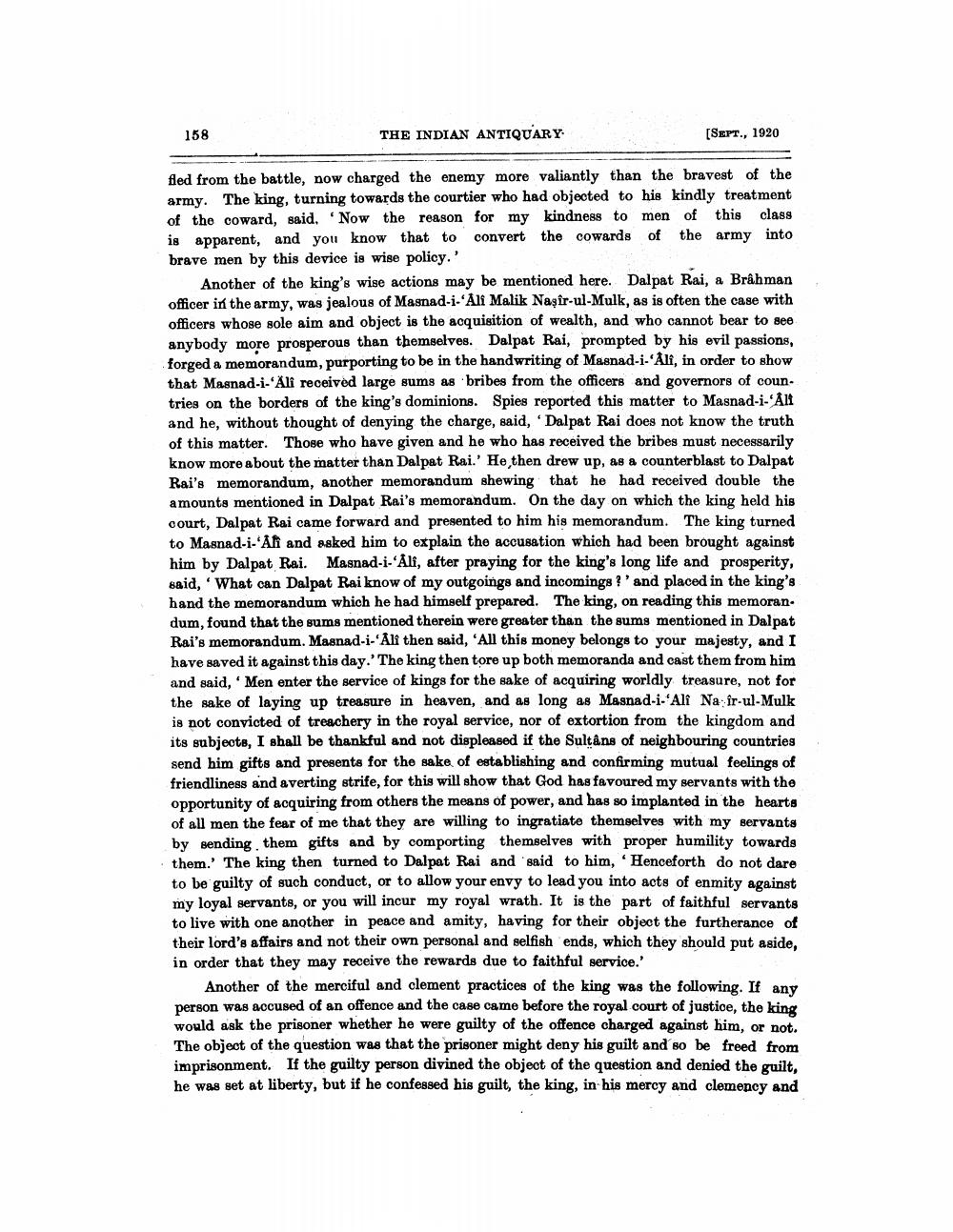________________
158
[SEPT., 1920
THE INDIAN ANTIQUARY
fled from the battle, now charged the enemy more valiantly than the bravest of the army. The king, turning towards the courtier who had objected to his kindly treatment of the coward, said. Now the reason for my kindness to men of this class is apparent, and you know that to convert the cowards of the army into brave men by this device is wise policy.'
Another of the king's wise actions may be mentioned here. Dalpat Rai, a Brahman officer in the army, was jealous of Masnad-i-'Ali Malik Naşir-ul-Mulk, as is often the case with officers whose sole aim and object is the acquisition of wealth, and who cannot bear to see anybody more prosperous than themselves. Dalpat Rai, prompted by his evil passions, forged a memorandum, purporting to be in the handwriting of Masnad-i-'Alî, in order to show that Masnad-i-'Alî received large sums as bribes from the officers and governors of countries on the borders of the king's dominions. Spies reported this matter to Masnad-i-'Alt and he, without thought of denying the charge, said, 'Dalpat Rai does not know the truth of this matter. Those who have given and he who has received the bribes must necessarily know more about the matter than Dalpat Rai.' He then drew up, as a counterblast to Dalpat Rai's memorandum, another memorandum shewing that he had received double the amounts mentioned in Dalpat Rai's memorandum. On the day on which the king held his court, Dalpat Rai came forward and presented to him his memorandum. The king turned to Masnad-i-'Ali and asked him to explain the accusation which had been brought against him by Dalpat Rai. Masnad-i-'Ali, after praying for the king's long life and prosperity, said, 'What can Dalpat Rai know of my outgoings and incomings?' and placed in the king's hand the memorandum which he had himself prepared. The king, on reading this memorandum, found that the sums mentioned therein were greater than the sums mentioned in Dalpat Rai's memorandum. Masnad-i-'Ali then said, 'All this money belongs to your majesty, and I have saved it against this day.' The king then tore up both memoranda and cast them from him and said, ' Men enter the service of kings for the sake of acquiring worldly treasure, not for the sake of laying up treasure in heaven, and as long as Masnad-i-'Ali Na ir-ul-Mulk is not convicted of treachery in the royal service, nor of extortion from the kingdom and its subjects, I shall be thankful and not displeased if the Sultans of neighbouring countries send him gifts and presents for the sake of establishing and confirming mutual feelings of friendliness and averting strife, for this will show that God has favoured my servants with the opportunity of acquiring from others the means of power, and has so implanted in the hearts of all men the fear of me that they are willing to ingratiate themselves with my servants by sending them gifts and by comporting themselves with proper humility towards them.' The king then turned to Dalpat Rai and said to him, 'Henceforth do not dare to be guilty of such conduct, or to allow your envy to lead you into acts of enmity against my loyal servants, or you will incur my royal wrath. It is the part of faithful servants to live with one another in peace and amity, having for their object the furtherance of their lord's affairs and not their own personal and selfish ends, which they should put aside, in order that they may receive the rewards due to faithful service.'
Another of the merciful and clement practices of the king was the following. If any person was accused of an offence and the case came before the royal court of justice, the king would ask the prisoner whether he were guilty of the offence charged against him, or not. The object of the question was that the prisoner might deny his guilt and so be freed from imprisonment. If the guilty person divined the object of the question and denied the guilt, he was set at liberty, but if he confessed his guilt, the king, in his mercy and clemency and




